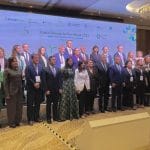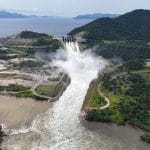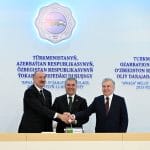While every country has a responsibility, major economies do have a special duty to the least developed and most vulnerable countries to tackle climate change, European Commission President Ursula von der Leyen said.
In her state of the union address (SOTEU) in the European Parliament on September 15, von der Leyen said the events of the summer only served to explain why the bloc needs to step up efforts to reduce emissions.
“We saw floods in Belgium and Germany. And wildfires burning from the Greek islands to the hills in France. And if we don’t believe our own eyes, we only have to follow the science,” she said, reminding that the UN recently published the IPCC report, the Intergovernmental Panel on Climate Change. It is the authority on the science of climate change. “The report leaves no doubt. Climate change is man-made. But since it is man-made, we can do something about it. As I heard it said recently: It’s warming. It’s us. We’re sure. It’s bad. But we can fix it. And change is already happening. More electric vehicles than diesel cars were registered in Germany in the first half of this year. Poland is now the EU’s largest exporter of car batteries and electric buses. Or take the New European Bauhaus that led to an explosion of creativity of architects, designers, engineers across our Union. So clearly something is on the move,” the EU Commission President said.
Turning to the European Green Deal, she noted that the EU Commission last year set a target of at least 55% emission reduction by 2030 and since then the bloc has turned its climate goals into legal obligations. “We are the first major economy to present comprehensive legislation in order to get it done. You have seen the complexity of the detail. But the goal is simple. We will put a price on pollution. We will clean the energy we use. We will have smarter cars and cleaner airplanes. And we will make sure that higher climate ambition comes with more social ambition. This must be a fair green transition. This is why we proposed a new Social Climate Fund to tackle the energy poverty that already 34 million Europeans suffer from,” von der Leyen said, noting that she counts on both Parliament and Member States to keep the package and to keep the ambition together. “When it comes to climate change and the nature crisis, Europe can do a lot. And it will support others. I am proud to announce today that the EU will double its external funding for biodiversity, in particular for the most vulnerable countries. But Europe cannot do it alone,” she said, stressing that the COP26 in Glasgow will be a moment of truth for the global community.
The Commission President noted that major economies – from the US to Japan – have set ambitions for climate neutrality in 2050 or shortly after. “These need now to be backed up by concrete plans in time for Glasgow. Because current commitments for 2030 will not keep global warming to 1.5°C within reach. Every country has a responsibility!” she said.
The goals that China’s President Xi Jinping has set for his country are encouraging, von der Leyen said. “But we call for that same leadership on setting out how China will get there. The world would be relieved if they showed they could peak emissions by mid-decade – and move away from coal at home and abroad. But while every country has a responsibility, major economies do have a special duty to the least developed and most vulnerable countries. Climate finance is essential for them – both for mitigation and adaptation,” she said.
In Mexico and in Paris, the major economies committed to provide $100 billion s a year until 2025 to the least developed and most vulnerable countries. “We deliver on our commitment. Team Europe contributes 25 billion dollars per year. But others still leave a gaping hole towards reaching the global target. Closing that gap will increase the chance of success at Glasgow. My message today is that Europe is ready to do more. We will now propose an additional 4 billion euro for climate finance until 2027. But we expect the United States and our partners to step up too,” she said, adding, “Closing the climate finance gap together – the US and the EU – would be a strong signal for global climate leadership. It is time to deliver.






